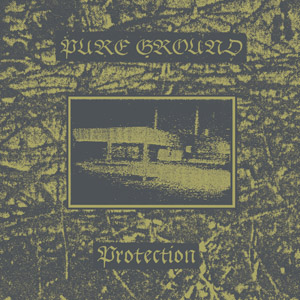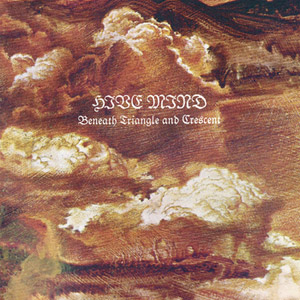Pure Ground, "Protection"; Hive Mind, "Beneath Triangle and Crescent"

Chondritic Sound label head Greh Holger initially began work as a harsh noise artist, but like many in that field, his tastes and art has changed and evolved, and on this pair of new releases that is completely evident. With both his synth pop project Pure Ground becoming a tighter band and his solo noise guise Hive Mind displaying even greater compositional tactics, he is definitely at the top of his game.
Pure Ground, which is Holger with Jesse Short, has only produced two EPs (this being the second), and a 7 inch single thus far, but even with that limited discography the duo are honing their craft rather quickly.Rather than being simply a showcase for vintage electronic instrumentation, like many in the minimal wave revival scene, "Atlantic Wall" is truly a hook laden aggressive pop song.The bass line that shifts from a catchy melody to a curt thump pairs perfectly with the snappy drum machine beat and noisy synth lead.The verse/chorus/verse structure is rather simplistic, but in the way that all good pop songs should, and leads to a memorable chorus that is extremely memorable.
The three remaining songs are just as good, but not in the same infectious way.The taut bass and shimmering synth pads of "From Outside" and serpentine lead and buried vocals of "With the Old Ways" are great in their own right, however, even if they do not have quite the same earworm quality.Pure Ground go darker and more dissonant on the closing piece, "Sacrificed to Purpose," which is more dissonant than the preceding with its immediate machinery pounding beat.With a shrill lead and everything bathed in liberal layers of reverb, it embraces texture more than hooks, and excels at its goal while making a fitting tribute to mid 1980s industrial.
 Hive Mind does not focus as much on rhythm and musicality on Beneath Triangle and Crescent, but they express more structure than previous, harsh noise focused works.The crackling noise and low end push of "Exodus" initially feels in league with the European school of power electronics, but soon changes.As a subtle hint of melodic synth throb begins to become prominent, the noise becomes darker and more oppressive before retreating.The remaining dissonance and depressive electronic melody feels more akin to Maurizio Bianchi's earlier work than it does that of Genocide Organ or the like.
Hive Mind does not focus as much on rhythm and musicality on Beneath Triangle and Crescent, but they express more structure than previous, harsh noise focused works.The crackling noise and low end push of "Exodus" initially feels in league with the European school of power electronics, but soon changes.As a subtle hint of melodic synth throb begins to become prominent, the noise becomes darker and more oppressive before retreating.The remaining dissonance and depressive electronic melody feels more akin to Maurizio Bianchi's earlier work than it does that of Genocide Organ or the like.
"Detritus" features a similar combination of melody and noise, with the former being more bleak and the latter harsher.Jagged, harsh sheets of distorted squeal crash and eventually take the piece back to the harsh noise days, but not before resembling an even more tortured, deconstructed version of The Cure’s Pornography.The final, side-long title piece embraces both of the extremes, with its overdriven low end and slow synthesizer sweeps giving it texture and depth.The slow build drifts back into the dour, depressive electronic territory, and keeps the harsher moments at bay for its full duration.
Between the indisputably catchy moments of Protection and depressive noise of Beneath Triangle and Crescent, Holger does not disappoint.Even with the more complex, song-oriented approach to these compositions, there remains that dirty, noisy edge of his earliest work, which goes a long way in giving these two sets of songs character and an identity all their own.
samples:
 



